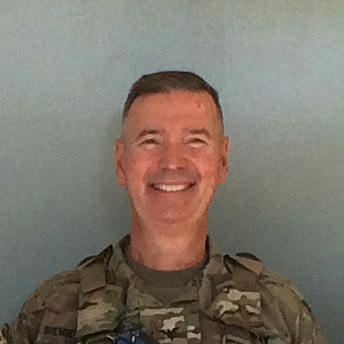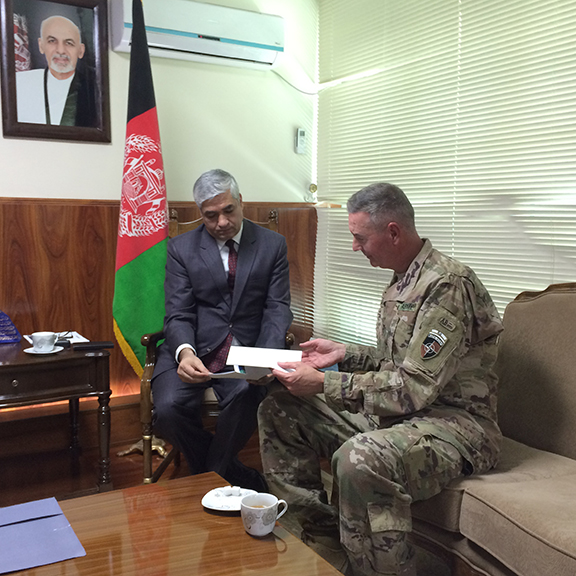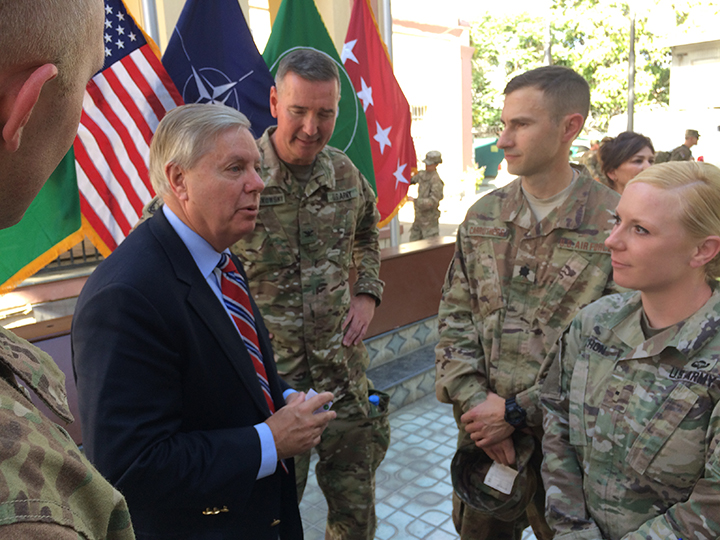 CUA Law alumnus, John J. Siemietkowski '87, a Justice Department trial lawyer in D.C., served as an Army JAG Colonel and strategic leader of an international coalition advising the Afghan Anti-Corruption Justice Center (ACJC) from October 2016 to September 2017.
CUA Law alumnus, John J. Siemietkowski '87, a Justice Department trial lawyer in D.C., served as an Army JAG Colonel and strategic leader of an international coalition advising the Afghan Anti-Corruption Justice Center (ACJC) from October 2016 to September 2017.
While in Afghanistan, Siemietkowsk trained Afghan judges, lawyers, and investigators responsible for prosecution of federal felony-equivalent crimes, worked closely with U.S. agencies and international entities charged with development and oversight of Afghan constitution and laws related to anti-corruption efforts, and managed reporting of human rights violations within Afghan police and military. He also served as a principal advisor to U.S. and NATO commanders, ambassadors, and international partners on coalition endeavors to curtail nepotism and graft, yielding a law-based Afghan culture.
Below is an interview with Siemietkowsk regarding his experiences:
What is the Afghan Anti-Corruption Justice Center and what did helping sustain it entail?
The idea of the Anti-Corruption Justice Center (ACJC) was conceived of by my predecessor at Resolute Support (RS), along with representatives of the UK Embassy (UK) and the United Nations Assistance Mission in Afghanistan (UNAMA). President Ghani decreed it into law in June 2016, and it officially opened just before I arrived in early October 2016. The idea was to dedicate a court to prosecuting high-level corruption, among government and private defendants. It is purposefully outside downtown Kabul, away from potential influence by Parliament, Ministries, and the Palace. Gosh, I could write 100 pages describing how we helped sustain it. We (primarily the three entities above, but also the US embassy and other members of the international community) worked with the ACJC logistically and substantively. Logistically, the UK spent approximately $2 million to build the ACJC a new facility; RS and NATO oversaw that construction. We provided security advice, and members of the international community ponied up money for security screening equipment and other material. Substantively, we encouraged the Afghan prosecutors to assemble evidence and begin bringing cases. We also had many discussions with prosecutors and judges to ensure the ACJC was operating within its jurisdictional limits. Along with frequent meetings between individual international entities (including me on behalf of RS) and the ACJC leadership, the international community as a whole also often met with the ACJC leadership, at sessions led by UNAMA.
 What were the challenges in working with the ACJC when you first got there?
What were the challenges in working with the ACJC when you first got there?
The biggest challenge was garnering ACJC credibility in the face of a skeptical Afghan public. Afghan prosecutors do not have a tradition of media relations as American prosecutors do, so we worked very hard at increasing Afghan media contact with the ACJC. Each ACJC trial was crowded with Afghan reporters and cameramen, yet we had to cajole the ACJC to name a media representative. We also worked extensively with our RS public affairs office to publicize on social media the work of the ACJC. Additionally, I personally met with Afghan reporters, as well as with French and German reporters, to answer their questions about this new and curious court. Additional challenges included convincing the Afghan government to allocate appropriate funds for the ACJC, and ensuring those funds reached the proper ACJC officials. More mundane challenges involved getting electric and Internet hook-ups to the new court facility, and helping arranging septic disposal. For the new courthouse's opening ceremony, the Afghans literally ran a large extension cord from an adjoining Afghan military base to the new courthouse to power up the courthouse!
What capacity did the other entities-the U.N., U.K., E.U.-serve and how did you navigate working with them?
UNAMA, the U.K., E.U., as well as the US and the Danish embassies, played pivotal roles in supporting the ACJC, and more generally, the fight against corruption in Afghanistan. The U.K. ambassador and E.U. deputy ambassador were particularly vocal in supporting the ACJC when meeting with President Ghani. UNAMA, the U.K., the Danes, and the EU actively mentored the ACJC prosecutors. UNAMA and the US Justice Attaché assisted me in conducting two training sessions for ACJC prosecutors at RS. In turn, I along with UNAMA and British attorneys led group training sessions sponsored by the US Justice Attaché at the embassy for a wide group of Afghan prosecutors and criminal investigators. Other countries, notably Australia, Japan, and Germany, also provided support, albeit of an indirect nature. Navigating the international community was easy. We had a lot in common, as we all were far from home, families and friends, living in austere conditions, and with a shared purpose. Most importantly, they were really good people.
 What were the successes of the ACJC?
What were the successes of the ACJC?
When I arrived in early October 2016, the ACJC has just opened and was operating in temporary quarters. By the time I left in late September 2017, the ACJC had moved to permanent space and prosecuted approximately 72 defendants in approximately 30 trials. In a country beset with terrorist violence, these tangible successes give the Afghan people hope that the rule of law can succeed in their country.
What would you tell a person who is considering a military law path?
It is a great career, even if only for a few years, yet you must recognize that, like any job, it has its drawbacks. Probably no other career will give you so much experience and responsibility so soon after law school. You will also have chances to live in and travel to some amazing places, which you might otherwise not visit. On the other hand, the Army tells you what your job will be and where you will live. Moreover, even with the great experiences, dodging car bombs and rocket attacks in Kabul is not for everyone!
